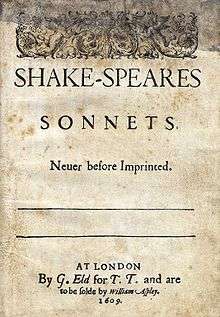Sonnet 79
Sonnet 79 is one of 154 sonnets published by the English playwright and poet William Shakespeare in 1609. It is part of the Fair Youth sequence, and the second sonnet of the Rival Poet sequence.
| Sonnet 79 | |||||||
|---|---|---|---|---|---|---|---|
 The first two stanzas of Sonnet 79 in the 1609 Quarto | |||||||
| |||||||
Exegesis
This sonnet continues the discussion of the previous sonnet, Sonnet 78, regarding other poets who also write poems dedicated to the fair youth. Sonnet 79 argues that the other poet deserves no thanks, because the quality of his writing derives from the quality of his subject. The poet (line 2) claims that earlier he had exclusively had the young man's patronage, or that his verse had exclusively been devoted to the young man's virtue or honor. But now those of his verses that benefited from the young man's grace ("gracious numbers"), are "decayed" because the youth's favors are being spread out and because the muse is not healthy ("sick muse"), which is a strange description considering the first line of Sonnet 78: "So oft have I invoked thee for my Muse".
The muse (line 4) makes room for another poet, or another muse. When the speaker desperately and unexpectedly refers (line 7) to the rival poet as "thy poet", it is clear that loyalties have shifted. The sestet turns the rival poet's effort to find appropriate metaphors into a materialistic endeavor ("He robs thee … he lends … he stole …") regarding merely skin-deep attractiveness ("found it in thy cheek”). The poet suggests a poem by a rival that has little to add, but proclaims the youth is as virtuous as his virtue, his cheek is as lovely as his cheek, and requires no “thanks".[2][3]
Structure
Sonnet 79 is an English or Shakespearean sonnet, which has three quatrains, followed by a final rhyming couplet. It follows the rhyme scheme ABAB CDCD EFEF GG, and is composed in iambic pentameter, a metre of five feet per line, with two syllables in each foot accented weak/strong. Most of the lines are examples of regular iambic pentameter, including the 2nd line:
× / × / × / × / × / My verse alone had all thy gentle grace; (79.2)
- / = ictus, a metrically strong syllabic position. × = nonictus.
The 4th line may be scanned with a rightward movement of the first ictus (the resulting four-position figure, × × / /, is sometimes referred to as a minor ionic):
× × / / × / × / × / And my sick Muse doth give another place. (79.4)
The meter calls for a 2-syllable pronunciation of "worthier" in the 6th line.[4]
Notes
- Shakespeare, William. Duncan-Jones, Katherine. Shakespeare’s Sonnets. Bloomsbury Arden 2010. p. 269 ISBN 9781408017975.
- Shakespeare, William. Duncan-Jones, Katherine. Shakespeare’s Sonnets. Bloomsbury Arden 2010. p. 268 ISBN 9781408017975.
- Hammond, Gerald. The Reader and the Young Man Sonnets. Barnes & Noble. 1981. p. 99-100. ISBN 978-1-349-05443-5
- Booth 2000, p. 273.
References
- First edition and facsimile
- Shakespeare, William (1609). Shake-speares Sonnets: Never Before Imprinted. London: Thomas Thorpe.CS1 maint: ref=harv (link)
- Lee, Sidney, ed. (1905). Shakespeares Sonnets: Being a reproduction in facsimile of the first edition. Oxford: Clarendon Press. OCLC 458829162.
- Variorum editions
- Alden, Raymond Macdonald, ed. (1916). The Sonnets of Shakespeare. Boston: Houghton Mifflin Company. OCLC 234756.
- Rollins, Hyder Edward, ed. (1944). A New Variorum Edition of Shakespeare: The Sonnets [2 Volumes]. Philadelphia: J. B. Lippincott & Co. OCLC 6028485.
- Modern critical editions
- Atkins, Carl D., ed. (2007). Shakespeare's Sonnets: With Three Hundred Years of Commentary. Madison: Fairleigh Dickinson University Press. ISBN 978-0-8386-4163-7. OCLC 86090499.
- Booth, Stephen, ed. (2000) [1st ed. 1977]. Shakespeare's Sonnets (Rev. ed.). New Haven: Yale Nota Bene. ISBN 0-300-01959-9. OCLC 2968040.
- Burrow, Colin, ed. (2002). The Complete Sonnets and Poems. The Oxford Shakespeare. Oxford: Oxford University Press. ISBN 978-0192819338. OCLC 48532938.
- Duncan-Jones, Katherine, ed. (2010) [1st ed. 1997]. Shakespeare's Sonnets. The Arden Shakespeare, Third Series (Rev. ed.). London: Bloomsbury. ISBN 978-1-4080-1797-5. OCLC 755065951.
- Evans, G. Blakemore, ed. (1996). The Sonnets. The New Cambridge Shakespeare. Cambridge: Cambridge University Press. ISBN 978-0521294034. OCLC 32272082.
- Kerrigan, John, ed. (1995) [1st ed. 1986]. The Sonnets ; and, A Lover's Complaint. New Penguin Shakespeare (Rev. ed.). Penguin Books. ISBN 0-14-070732-8. OCLC 15018446.
- Mowat, Barbara A.; Werstine, Paul, eds. (2006). Shakespeare's Sonnets & Poems. Folger Shakespeare Library. New York: Washington Square Press. ISBN 978-0743273282. OCLC 64594469.
- Orgel, Stephen, ed. (2001). The Sonnets. The Pelican Shakespeare (Rev. ed.). New York: Penguin Books. ISBN 978-0140714531. OCLC 46683809.
- Vendler, Helen, ed. (1997). The Art of Shakespeare's Sonnets. Cambridge, MA: The Belknap Press of Harvard University Press. ISBN 0-674-63712-7. OCLC 36806589.
.png)
